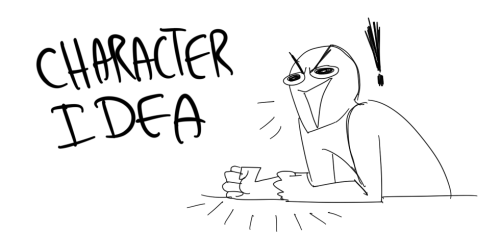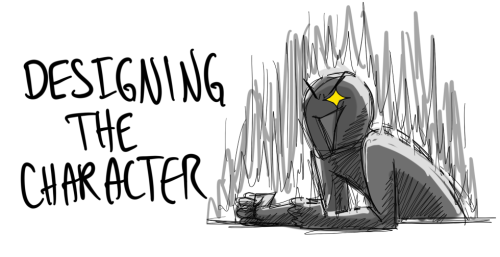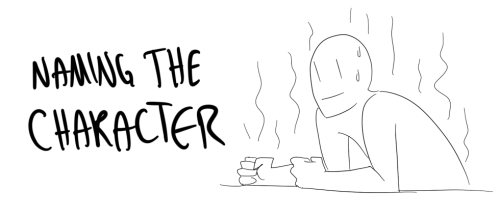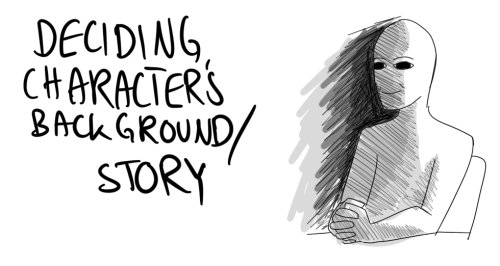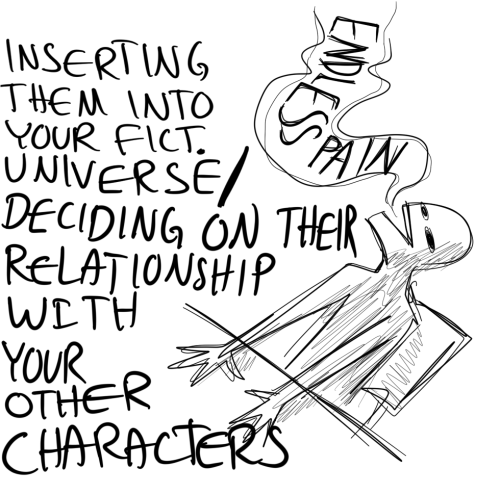Ways I Show A Character Is Grieving
Ways I Show a Character Is Grieving
They say "It’s fine, I’ve processed it" while clearly processing it through spreadsheets, sarcasm, or passive-aggressive emails.
They treat memories like landmines. They avoid certain songs, places, and foods like they bite and they kind of do.
They hoard weird things. A receipt. A voicemail. A cracked mug. Objects that wouldn’t matter to anyone else but now feel sacred.
They laugh at really inappropriate times. At funerals. In therapy. During serious conversations. It’s not funny, they just don’t know what else to do.
They forget things. Not just dates. Entire days. Their brain is buffering because it’s too full of everything they don’t want to feel.
They get too angry at tiny things. The pen runs out? Full mental breakdown. It’s never about the pen.
They say “they wouldn’t want me to be sad” as a way to guilt-trip themselves into pretending they’re not actively falling apart.
More Posts from Sparklingsilvermagnolias and Others
Avoiding the “Mary Sue” trap while creating characters.
A “Mary Sue” is that charact. Perfect; bends the story to their will, faces no meaningful struggles, and often feels too idealized to be relatable. The thing I like most is when an author makes a character, a situation, a scene, realistic. I like heavy realism in my books. I know we read to escape reality, but there's a way to do that.
1. Give Them Flaws Not the checklist kind. Not "clumsy" or "bad at math" unless that genuinely bleeds into who they are and how they move through the world. I mean the kind of flaws that crack open relationships. That drive certain choices. That make you want to shake them. Flaws should cost them something. Otherwise, they’re decoration.
2. Let Them Fail Failure is the most human thing. It brings shame, doubt, growth, all the stuff that makes a character feel alive. Let them try, and stumble. Let them mess up something important. Let them hurt people and not know how to fix it. Failure opens narrative doors that perfection just slams shut.
3. Don’t Make Everyone Love Them If every side character is just there to admire your MC, you’re not writing a story—you’re writing propaganda. Let people mistrust them. Let some hate them. Not everyone sees the same version of a person. Maybe someone sees behind their act, maybe someone’s immune to their charm. That gives perspective.
4. Make Their Skills Believable A skill with no backstory is just plot armor. If they're good at something, show why. Time. Training. Failure. Maybe they’re not even the best—just someone who works harder than they should have to. That’s infinitely more compelling than someone who just is talented for no reason.
5. Avoid Overloading Them With Traits They don’t need to be smart, funny, hot, tragic, a prodigy, a rebel, and an empath who bakes when sad. Choose what matters. Strip it down to the few traits that define them, the ones they carry into every scene. Complexity is about layers, not a pile of labels.
6. Give Them Internal Conflict We all contradict ourselves. That’s the beauty of it. Your character should wrestle with decisions. Regret them. Say one thing and feel another. Inner conflict is what separates a walking trope from a person we believe in.
7. Let the Plot Push Back The world shouldn’t bend for your character. The plot should push them, break them, make them bleed for the win. Their goals should cost something. The story isn’t just their playground—it’s the pressure cooker where they get tested. If they’re never cornered, what’s the point?
8. Ensure They Don’t Eclipse the Entire Cast Other characters are not props. Give them wants, voices, limits. They don’t exist to spotlight the protagonist—they exist to breathe life into the story. And your MC is more interesting when they’re surrounded by people who push them, contradict them, challenge them.
9. Avoid Unrealistic Morality Nobody’s always right. And honestly, it’s annoying when they are. Let them justify things that aren’t justifiable. Let them fail to see another perspective. Let them believe they’re in the right—until they’re not. Give them a compass that doesn’t always point true north.
10. Make Them Struggle to Earn Trust Trust is a slow build. People remember hurt. They hesitate. Let your MC do the work—prove themselves, fail, rebuild. Trust earned over time is more satisfying than instant loyalty that comes out of nowhere.
I hate perfect characters. Especially when it’s pretend perfection. Like what do you mean he has abs when he has no time to workout? Like what do you mean she is so put together all the time? In this economy?
let's write something raw, something realistic.
fandomite-brained “progressive” and “queer positive” intellectuals will tell you with a straight face that certain pieces of fictional art like rap songs or comedic jokes or fifty shades of grey can socially sanction or enshrine rape culture, but their 25 chapter gay noncon omegaverse ao3 fanfiction that is publicly available on the world wide web is somehow ontologically different. They think they can hide their contradictions from me, lol. they are so cute hehe you’re so bad at obscuring your affinities behind flimsy platitudes you little freak (steps on them with my steel toed boot).
you don’t realize how bad it is until you start noticing that impatience has become common currency. watching a full 2-hour movie from the comfort of your couch is torture - even a 25-minute series episode is too much. you can’t stand still while waiting for the bus without reaching out for your phone and opening something - any app, even to check the weather for the millionth time that day.
even conversations are suddenly taking too long, and when you look around, you start hearing all these absurd stories of how people are skipping paragraphs while ‘reading’ books because they think descriptions are boring or just ‘need to’ finish faster to reach their reading goals.
How to Write a Character Who Feels Like Throwing Up
When fear, dread, or guilt gets sickening—literally—your character is consumed with a gut-clenching feeling that something is very, very wrong. Here's how to write that emotion using more than the classic "bile rose to the back of their throat".
Start with the Stomach
This isn’t just about discomfort. It’s about a complete rebellion happening inside their body.
Their stomach twists like a knot that keeps pulling tighter
A cold sweat beads on their neck, their palms, their spine
Their insides feel sludgy, like everything they’ve eaten is suddenly unwelcome
They double over, not from pain, but because sitting still feels impossible
Add Sensory Overload
Vomiting isn’t just a stomach reaction—it’s the whole body.
Their mouth goes dry, and then too wet
Their jaw tightens, trying to contain it
A sudden heat blooms in their chest and face, overwhelming
The back of their throat burns—not bile, but the threat of it
Breathing becomes a conscious effort: in, out, shallow, sharp
Emotional Triggers
Nausea doesn’t always need a physical cause. Tie it to emotion for more impact:
Fear: The kind that’s silent and wide-eyed. They’re frozen, too sick to speak.
Guilt: Their hands are cold, but their face is flushed. Every memory plays like a film reel behind their eyes.
Shock: Something just snapped inside. Their body registered it before their brain did.
Ground It in Action
Don’t just describe the nausea—show them reacting to it.
They press a fist to their mouth, pretending it’s a cough
Their knees weaken, and they lean on a wall, pretending it’s just fatigue
They excuse themselves quietly, then collapse in a bathroom stall
They swallow, again and again, like that’ll keep everything down
Let the Consequences Linger
Even if they don’t actually throw up, the aftermath sticks.
A sour taste that won’t leave their mouth.
A pulsing headache
A body that feels hollowed out, shaky, untrustworthy
The shame of nearly losing control in front of someone else
Let Them Be Human
A character feeling like vomiting is vulnerable. It's real. It’s raw. It means they’re overwhelmed in a way they can’t hide. And that makes them relatable. You don’t need melodrama—you need truth. Capture that moment where the world spins, and they don’t know if it’s panic or flu or fear, but all they want is to get out of their own body for a second.
Don't just write the bile. Write the breakdown.
Battling Writer's Block
Believe it or not there are people out there who believe that writer's block isn't a thing. Nope, I'm not kidding, that is what my lecturer said last year and I just want to assure anyone that may believe it doesn't exist/ or are thinking of giving up on their work, don't. It is a very real thing and is very common to experience especially if you've written so much that you've managed to burn yourself out. Also, nobody in my class liked that lecturer for the rest of the year after making that comment so if you don't believe it's real...I wish you luck is all I'm gonna say lol.
So how do you prevent this?
Well first of all, you can't, but you can decrease how likely it is to happen.
Organisation
First thing is first, get your notes and your characters down somewhere you can look at them. Organisation will help a ton. Personally I have notes scattered all over the place both physical and on a folder on my laptop. Ideas come at random so I jot them down and then always forgot to put the physical notes somewhere. This meant I got stressed because I knew I had a good idea but couldn't remember exactly what it was. I did end up finding the notes and have now bought a folder to store my papers in. But this disorganisation meant I spent a lot of time overthinking my skills as a writer which then affected my confidence and ultimately resulted in writer's block.
Create
The next thing you can do is relax and create. Plots will come in time, focus on creating -- that's the fun bit especially if you're working in the fantasy or sci-fi genre! Don't create your plots first because as soon as you create your characters you might realise those plots won't work with those characters anymore. While this may not directly contribute to writer's block it definitely could affect your confidence so if you already have a good plot idea but find your characters don't fit then store away the idea for later to use with characters that will work for it.
Also I know I only focused on the writing aspect of creation but if you want to create other things then do that, too! Draw, make models, maybe a small mistake you make might give you inspiration!
Take a walk
This is common advice I see and that is taking a walk. If you can't find the inspiration to work on your current project but want to write something, grab your laptop or notebook and just wander around in a park and focus on your senses. What can you hear? What are the conversations people are having? What can you see? Try and show it instead of telling. Is there wind, can you feel it?
Create Your Own Definition For Your Favourite Words
If you don't want to write something too complicated and can feel your motivation disappearing but want to try and regain it, search for words and show your meanings for it instead of what the official definition is. For example the word 'love', the official definition is generalised and always straight to the point but the word means different things for different people. So what is love to you?
Poetry
Adding onto the previous paragraph, maybe try poetry! Last year I was dreading my poetry module but I have actually enjoyed it so far. I never thought I would but at 3am I find myself drafting up a poem to work on the next day. I do have old notes somewhere so when I find them I'll post them here so you have a sort of visual for how some poetry forms work. My favourite type of poetry is freeverse so if you're wanting to create a story without necessarily rhyming but keeping within the poetry theme, that would be a great way to start!
Relax
Finally, read. Sit down somewhere with a cup of hot chocolate or your favourite drink and read. Take some time for yourself, your writing isn't going anywhere and either way it takes time. Writing is a skill to develop not something to rush. Rushing will result in confusion and you may miss out some minor plot points you wanted to add. Reading helps you learn so pick out pieces that you enjoy from the book and see if you can incorporate it into your own work somehow.
To all my fellow writers out there, take a breath. Everything will come to you in time.

This woman holds the highest recorded IQ ever: an astonishing 228. Far surpassing Einstein (160-190), Hawking (160), and Musk (155). Yet, despite her brilliance, she faced ridicule for her response to a seemingly simple problem.
But she saw what no one else could.
Here’s her story:
Marilyn Vos Savant was far from an ordinary child.
By the age of 10, she had:
• Memorized entire books
• Read all 24 volumes of the Encyclopedia Britannica
• Achieved the highest recorded IQ of 228
She seemed destined for a life of genius.
But reality took a different turn.
“No one paid much attention to me—mostly because I was a girl. And I accepted that,” Marilyn Vos Savant once said.
She attended a regular public school, left Washington University after two years to help run her parents' business, and seemed destined for an ordinary life.
But in 1985, everything changed.
The Guinness Book of World Records listed her as having the "Highest IQ" ever recorded: 228.
Suddenly, Marilyn was thrust into the spotlight:
• Featured on the covers of New York Magazine and Parade Magazine
• Guest on Late Night with David Letterman
But she couldn’t have anticipated what lay ahead.
The Rise and the Question
Marilyn joined Parade Magazine to write the iconic "Ask Marilyn" column—a dream for someone with a passion for writing.
Yet, this dream turned into a nightmare with a single question in September 1990.
The Monty Hall Problem
Named after Monty Hall, the host of Let’s Make a Deal, the question went like this:
You’re on a game show.
There are 3 doors.
• 1 door hides a car.
• The other 2 hide goats.
You choose a door. The host opens another door, revealing a goat.
Should you switch doors?
Marilyn’s answer: “Yes, you should switch.”
The backlash was overwhelming. She received over 10,000 letters, including nearly 1,000 from PhDs, insisting she was wrong:
• “You are the goat!”
• “You blew it, and you blew it big!”
• “Maybe women look at math problems differently than men.”
But was she wrong?
The Math Behind the Answer
Consider the two possible scenarios:
You pick the car (1/3 chance):
• If you switch, you lose.
You pick a goat (2/3 chance):
• Monty reveals the other goat.
• If you switch, you win.
Switching gives you a 2/3 chance of winning.
Eventually, her answer was proven correct.
Vindication
MIT ran computer simulations confirming her logic.
MythBusters tested it and reached the same conclusion.
Some academics even apologized.
So why did so many fail to see the truth?
The Reasons People Got It Wrong
• They "reset" the scenario instead of recognizing the shifting probabilities.
• The simplicity of 3 doors obscured the underlying math.
• Many assumed each remaining door had a 50% chance.
Marilyn’s View
Marilyn blamed the compulsory schooling system for discouraging independent thinking. She argued that it:
• Creates passive learners
• Stifles exploration
• Hinders critical thinking
A Blessing and a Burden
Marilyn admits that her intellect often feels isolating—there’s no one to turn to when she needs answers.
Still, she sees her intelligence as a gift, not a curse .
Please Follow Forbidden Stories
For More interesting Stories
How Your Characters Might Flirt Using Food (Because Food = Love)
Because sometimes “I love you” sounds like “did you eat?”
“I saved the last piece for you.” → Literal affection disguised as generosity.
“This isn’t as good as the one you like, but it’s close.” → Translation: I pay attention.
“Try this. No, just—trust me.” → Feeding them is flirting. End of story.
“I remembered you don’t like onions, so I left them out.” → That’s a love letter.
“I burned it. You’re eating it anyway.” → Domestic chaos = love language unlocked.
“You always steal bites, so I got you your own.” → He saw, he adapted. Soulmate.
“You’re not allowed to fall in love with anyone who cooks better than me.” → Petty? Maybe. Adorable? Absolutely.
20 Compelling Positive-Negative Trait Pairs
Here are 20 positive and negative trait pairs that can create compelling character dynamics in storytelling:
1. Bravery - Recklessness: A character is courageous in the face of danger but often takes unnecessary risks.
2. Intelligence - Arrogance: A character is exceptionally smart but looks down on others.
3. Compassion - Naivety: A character is deeply caring but easily deceived due to their trusting nature.
4. Determination - Stubbornness: A character is persistent in their goals but unwilling to adapt or compromise.
5. Charisma - Manipulativeness: A character is charming and persuasive but often uses these traits to exploit others.
6. Resourcefulness - Opportunism: A character is adept at finding solutions but is also quick to exploit situations for personal gain.
7. Loyalty - Blind Obedience: A character is fiercely loyal but follows orders without question, even when they're wrong.
8. Optimism - Denial: A character remains hopeful in difficult times but often ignores harsh realities.
9. Humor - Inappropriateness: A character lightens the mood with jokes but often crosses the line with their humor.
10. Generosity - Lack of Boundaries: A character is giving and selfless but often neglects their own needs and well-being.
11. Patience - Passivity: A character is calm and tolerant but sometimes fails to take action when needed.
12. Wisdom - Cynicism: A character has deep understanding and insight but is often pessimistic about the world.
13. Confidence - Overconfidence: A character believes in their abilities but sometimes underestimates challenges.
14. Honesty - Bluntness: A character is truthful and straightforward but often insensitive in their delivery.
15. Self-discipline - Rigidity: A character maintains strong control over their actions but is inflexible and resistant to change.
16. Adventurousness - Impulsiveness: A character loves exploring and trying new things but often acts without thinking.
17. Empathy - Overwhelm: A character deeply understands and feels others' emotions but can become overwhelmed by them.
18. Ambition - Ruthlessness: A character is driven to achieve great things but willing to do anything, even unethical, to succeed.
19. Resilience - Emotional Detachment: A character can endure hardships without breaking but often seems emotionally distant.
20. Strategic - Calculative: A character excels at planning and foresight but can be cold and overly pragmatic in their decisions.
These pairs create complex, multi-dimensional characters that can drive rich, dynamic storytelling.
---
+ If you find my content valuable, consider Support This Blog on Patreon!
-
 81014 liked this · 2 weeks ago
81014 liked this · 2 weeks ago -
 justheretoreadfanfic222 liked this · 2 weeks ago
justheretoreadfanfic222 liked this · 2 weeks ago -
 goddessofliteratureandsarcasm liked this · 2 weeks ago
goddessofliteratureandsarcasm liked this · 2 weeks ago -
 invisiboom12 liked this · 2 weeks ago
invisiboom12 liked this · 2 weeks ago -
 platypus-brained liked this · 2 weeks ago
platypus-brained liked this · 2 weeks ago -
 justonemorewallflower liked this · 2 weeks ago
justonemorewallflower liked this · 2 weeks ago -
 sighed-the-snake liked this · 2 weeks ago
sighed-the-snake liked this · 2 weeks ago -
 galaxy-of-writing-prompts reblogged this · 2 weeks ago
galaxy-of-writing-prompts reblogged this · 2 weeks ago -
 felishaww liked this · 2 weeks ago
felishaww liked this · 2 weeks ago -
 gingergremlin420 liked this · 2 weeks ago
gingergremlin420 liked this · 2 weeks ago -
 princesxxse liked this · 2 weeks ago
princesxxse liked this · 2 weeks ago -
 cl-oudyca-kes reblogged this · 2 weeks ago
cl-oudyca-kes reblogged this · 2 weeks ago -
 cl-oudyca-kes liked this · 2 weeks ago
cl-oudyca-kes liked this · 2 weeks ago -
 anxioushistoriansstuff liked this · 2 weeks ago
anxioushistoriansstuff liked this · 2 weeks ago -
 ohhoneydoll reblogged this · 2 weeks ago
ohhoneydoll reblogged this · 2 weeks ago -
 ladysibyl reblogged this · 2 weeks ago
ladysibyl reblogged this · 2 weeks ago -
 ladysibyl liked this · 2 weeks ago
ladysibyl liked this · 2 weeks ago -
 mediocre-artist liked this · 2 weeks ago
mediocre-artist liked this · 2 weeks ago -
 bring-methe-night liked this · 2 weeks ago
bring-methe-night liked this · 2 weeks ago -
 sillyyduck liked this · 2 weeks ago
sillyyduck liked this · 2 weeks ago -
 ndb-novel reblogged this · 2 weeks ago
ndb-novel reblogged this · 2 weeks ago -
 ndb-123 liked this · 2 weeks ago
ndb-123 liked this · 2 weeks ago -
 write-on-world reblogged this · 2 weeks ago
write-on-world reblogged this · 2 weeks ago -
 patchworkmags liked this · 2 weeks ago
patchworkmags liked this · 2 weeks ago -
 gracieischaos liked this · 2 weeks ago
gracieischaos liked this · 2 weeks ago -
 the-anonymous-unikitty liked this · 2 weeks ago
the-anonymous-unikitty liked this · 2 weeks ago -
 smolciestar liked this · 2 weeks ago
smolciestar liked this · 2 weeks ago -
 venusvixen20 liked this · 2 weeks ago
venusvixen20 liked this · 2 weeks ago -
 aymerictheblue liked this · 2 weeks ago
aymerictheblue liked this · 2 weeks ago -
 mar-coral liked this · 2 weeks ago
mar-coral liked this · 2 weeks ago -
 lifeharbinger98 liked this · 2 weeks ago
lifeharbinger98 liked this · 2 weeks ago -
 efleurmeral liked this · 2 weeks ago
efleurmeral liked this · 2 weeks ago -
 jcmaiscute reblogged this · 2 weeks ago
jcmaiscute reblogged this · 2 weeks ago -
 pink-ie liked this · 2 weeks ago
pink-ie liked this · 2 weeks ago -
 soupinpan4 liked this · 2 weeks ago
soupinpan4 liked this · 2 weeks ago -
 mendelworth liked this · 2 weeks ago
mendelworth liked this · 2 weeks ago -
 icanscribblestuff liked this · 2 weeks ago
icanscribblestuff liked this · 2 weeks ago -
 saintcxrsed liked this · 2 weeks ago
saintcxrsed liked this · 2 weeks ago -
 fhteehj liked this · 2 weeks ago
fhteehj liked this · 2 weeks ago -
 write-on-world liked this · 2 weeks ago
write-on-world liked this · 2 weeks ago -
 kikothedragoncat liked this · 2 weeks ago
kikothedragoncat liked this · 2 weeks ago -
 indecisive-blob liked this · 2 weeks ago
indecisive-blob liked this · 2 weeks ago -
 ivylovesdogs-blog liked this · 2 weeks ago
ivylovesdogs-blog liked this · 2 weeks ago -
 palerubyart liked this · 2 weeks ago
palerubyart liked this · 2 weeks ago -
 i-am-bella-donna liked this · 2 weeks ago
i-am-bella-donna liked this · 2 weeks ago -
 wrappeddinplastic liked this · 2 weeks ago
wrappeddinplastic liked this · 2 weeks ago -
 queenoflanguage reblogged this · 2 weeks ago
queenoflanguage reblogged this · 2 weeks ago -
 kashadude liked this · 2 weeks ago
kashadude liked this · 2 weeks ago -
 thesassyspork liked this · 2 weeks ago
thesassyspork liked this · 2 weeks ago -
 ground-zero0 liked this · 2 weeks ago
ground-zero0 liked this · 2 weeks ago

119 posts

